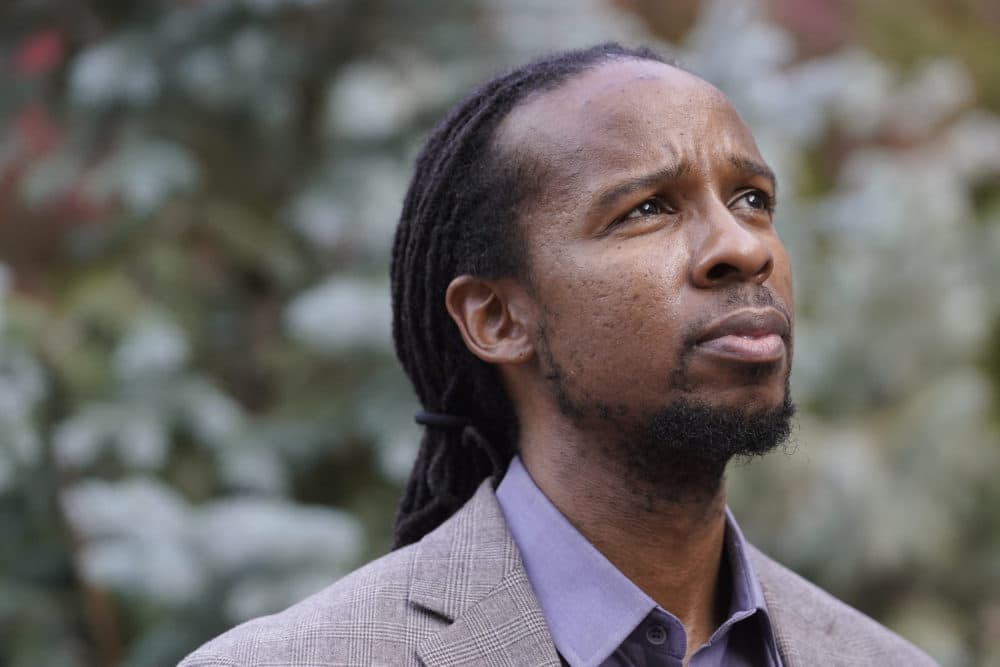Advertisement
BU launches inquiry into 'management culture' at Center for Antiracist Research

Following sudden layoffs last week at Boston University's Center for Antiracist Research, the school said it is conducting an inquiry into the center’s “management culture” and “grant management practices” under its leader and founder, the scholar and activist Ibram X. Kendi.
In a written statement provided to WBUR Wednesday, a BU spokeswoman said the university had initially launched an examination into the center's grant management practices after receiving complaints in the wake of the layoffs, which was first reported by The Boston Globe.
That inquiry has now expanded to include the management culture at the Center after additional information came to light, according to BU's statement.
In an updated statement released late in the day Thursday, the university said "Kendi made the decision to transition the center to a fellowship model, rather than producing its own research."
The statement added that Kendi "announced the layoffs as part of a restructuring." In total, 19 staff members were laid off, or roughly half the staff. Remaining is a team of 15 to 17 people, according to BU. Links to staff information on the center's website currently lead to empty pages.
"We are in the process of convening an internal group that will examine grants management and productivity, and we will be asking an external consultant to review the organizational climate and respond to concerns that have been raised with management and culture," BU's interim president Kenneth Freeman said Thursday in a statement.
News of the sudden layoffs sent a ripple of shock around the BU community given the stature and prominence of Kendi, a nationally renowned scholar on race and best-selling author of the 2019 non-fiction book, "How to Be an Antiracist."
Kendi, 41, originally founded what used to be known as the Antiracist Research and Policy Center in 2017 at American University in Washington D.C. BU recruited him to move the program to Boston University in June 2020. At the time, BU leadership told WBUR the new Center for Antiracist Research would "bring together researchers and practitioners from across the university to engage around issues of racism and racial justice."
The announcement of BU's new center came several days after news broke about the murder of George Floyd, though school officials say discussions around BU's Center for Antiracist Research began about a year prior.
Staff at the Center was tasked with pursuing multiple projects, including the creation of a racial disparities database, an anti-racist graduate degree program and a media publication. That multimedia platform, The Emancipator, "will continue and is not impacted" by the recent layoffs, BU spokesman Colin Riley told WBUR last week.
Kendi was a guest on WBUR's Radio Boston as recently as June 2023 to discuss a new graphic novel adaptation of his 2016 book, "Stamped from the Beginning: The Definitive History of Racist Ideas in America," which earned a National Book Award for Nonfiction. He also appeared on the show in May, during which Kendi said the Center was in the process of "building and really even launching very soon our racial data tracker."
That data tracker is one project reportedly that has yet to lift up off the ground.
Some former staff members disclosed to the Globe their concerns about management of grant funds and the progress of several projects housed at the BU Center for Antiracist Research. The center reportedly received up to $43 million since its inception, reported The Daily Free Press, BU's independent student newspaper.
Among its financial contributions were tens of millions of dollars in financial gifts and grant money, including $10 million from Jack Dorsey, the co-founder of Twitter. Other donations came from companies like biotech company Vertex and the Rockefeller Foundation.
Staff members also told The Daily Free Press that the center had been struggling with high staff turnover, disorganization and a toxic work environment for much of its existence.
Some former staff members at the center contacted by WBUR Thursday declined to comment. Kendi did not respond to WBUR's request for an interview. In a statement he posted Friday to X, the social media platform formerly known as Twitter, Kendi defended the structural changes made at the Center.
"I made this decision not out of financial distress — as suggested by some — but to put in place a new structure that would support the mission of CAR for the long term," he wrote.
His statement also addressed the allegations of a toxic work environment. Kendi said launching in the middle of the pandemic made management and culture-building more challenging. He acknowledged that "we made missteps" but said he's working to build a stronger organization for the future. The post concluded with Kendi highlighting that "leaders of color and women leaders are often held to different standards and routinely have their authority undermined or questioned."
Kendi is scheduled to deliver opening remarks at a Saturday symposium for journalists at BU organized by the Emancipator, per a schedule of events.
Editor's Note: Boston University owns WBUR's broadcast license. WBUR is editorially independent.
This article was originally published on September 21, 2023.
